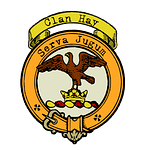Welcome back to "A Clan A Day Podcast," brought to you by bagtownclans.com. I'm your host, Colin MacDonald. Today, we're journeying into the heart of Clan Robertson, or as they're traditionally known, Clan Donnachaidh. With a complex history of loyalties, rebellions, and a profound cultural legacy, this clan has woven itself into the fabric of Scotland's storied past. Let’s dive in and explore their origins, evolution, and enduring spirit.
Traditionally, the origins of Clan Donnachaidh are shrouded in mystery and contested theories. One popular belief is that they are descended from the MacDonalds, specifically from Duncan, son of Angus Mor, Lord of the Isles. This theory, supported by some historians like Smibert, posits that the Robertsons came from the Western Celts, connected to the powerful house of Somerled, the Kings of the Isles. Skene, another respected historian, offers a different lineage, tracing their roots to Duncan I, King of Scotland, and through Conan, son of Henry, the last Celtic Earl of Atholl. Regardless of the exact origin, it's clear that the Robertsons, under their Gaelic name, Clan Donnachaidh, have deep roots in Scottish history, likely linked to significant figures and events that shaped the nation.
The clan’s story truly takes shape in the medieval period, with their lands in the rugged region of Atholl, in Perthshire. Here, the clan established itself under the leadership of Duncan, the progenitor after whom they were named—Clan Donnachaidh, meaning "Children of Duncan." Duncan’s descendant, Robert de Atholia, who was known for his daring raids into the Lowlands, significantly marked the clan's early reputation. His actions in capturing Robert Graham and the Master of Atholl, two of the conspirators involved in the murder of King James I, earned him a crown charter from James II in 1451. This reward also included an unusual augmentation to the clan’s coat of arms: a naked man, manacled, symbolizing the capture of the regicides.
From these early days, the clan's fortunes were closely tied to the shifting tides of Scottish politics. The Robertsons were staunch royalists, consistently aligning themselves with the Stewart kings. This loyalty was not without its costs. During the Wars of the Three Kingdoms, Donald Robertson led his clan in support of the royalist Marquis of Montrose, demonstrating their commitment on the battlefield at Inverlochy. For his services, Donald received a pension from Charles II after the Restoration.
However, the clan’s fortunes ebbed and flowed with the tumultuous political landscape of the time. The 17th century saw the Robertsons embroiled in local feuds and broader conflicts. Alexander Robertson, the 13th chief, known as the "Poet Chief," was a notable figure in both the cultural and political realms. A dedicated Jacobite, Alexander's support for the cause of James VII during the rising of 1689, and later in 1715 and 1745, underscored the clan's unwavering loyalty to the Stewarts. Though not actively participating in the Battle of Culloden due to his age, his influence was felt as he marshaled his clan in support of the Jacobite cause.
The aftermath of the Jacobite risings proved disastrous for Clan Donnachaidh. Following the 1745 uprising, Alexander's estate was forfeited to the Crown. However, in a twist of fate, part of the clan's lands, including the ancestral seat at Struan, were restored to a later chief in 1784. This reprieve, however, did not shield the clan from further hardships, particularly during the Highland Clearances of the 19th century. The clearances saw many Highlanders displaced from their lands, and the Robertsons were no exception, with many forced to seek new lives abroad.
Despite these trials, the clan endured, adapting to the changing world around them. The later chiefs, while continuing to bear the title "Baron of Struan," moved away from their ancestral homeland, with some even settling in Jamaica. Yet, the spirit of Clan Donnachaidh remained resilient. Today, the clan continues to thrive, celebrating its rich heritage and history through the Clan Donnachaidh Society, which plays a pivotal role in preserving the clan’s legacy and fostering a sense of community among its members worldwide.
Clan Robertson’s contributions extend beyond the battlefield and political machinations. Culturally, they have left an indelible mark on Scottish history. Alexander Robertson, the Poet Chief, was a renowned writer, whose works reflected the turbulent times he lived through and the deep-rooted traditions of his people. His poetry, along with his “History and Martial Achievements of the Robertsons of Struan,” provides a vivid window into the life and mindset of the Highland chiefs.
In modern times, the legacy of Clan Robertson is commemorated not only in historical texts but also through symbols like their tartan and crest, which features a hand holding an imperial crown, underscoring their historic loyalty to the Scottish crown. Their motto, "Virtutis gloria merces," meaning "Glory is the reward of valour," aptly encapsulates the clan’s enduring spirit.
Thank you for joining us on this exploration of Clan Robertson, a family whose story is one of resilience, loyalty, and enduring pride. Be sure to tune in tomorrow for another episode of "A Clan A Day Podcast." I'm Colin MacDonald, and as always, Go n-éirí an bóthar leat.











